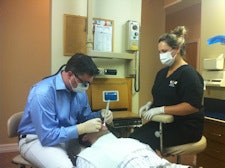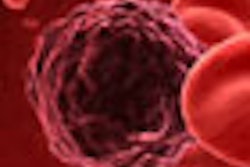
A Texas dentist who specializes in oncology has seen his practice grow quickly as cancer patients struggle with the side effects of chemotherapy and radiation treatment. Some 1.6 million new cases of cancer are diagnosed annually, and approximately 12 million people are living with cancer, according to the National Cancer Institute (NCI).
While more cancer patients are surviving due to advanced chemotherapy and radiation treatments, the therapy often causes oral problems, such as mucositis, xerostomia, oral and systemic infections, and accelerated caries development.
 Oncology specialist Dr. Dennis Abbott has seen his practice grow as more cancer patients struggle with oral side effects of treatment. Image courtesy of Dental Oncology Professionals of North Texas.
Oncology specialist Dr. Dennis Abbott has seen his practice grow as more cancer patients struggle with oral side effects of treatment. Image courtesy of Dental Oncology Professionals of North Texas.
But many dentists refuse to treat patients with these conditions due to the increased risk of osteonecrosis from radiation treatment or bisphosphonate use and other potential complications.
When Dennis Abbott, DDS, noticed more of these patients coming into his Garland, TX, practice, many of whom had been turned away by other dentists, he realized there was a large, unmet need to treat their oral complications.
One patient in particular motivated him to open Dental Oncology Professionals of North Texas: a man whose lung cancer was in remission who came to him after being denied treatment by another dentist.
"He had so much damage to his teeth -- multiple root canals and fillings, chronic dry mouth," Dr. Abbott recalled.
Dr. Abbott underwent additional training at the State University of New York at Buffalo, is on the staff at the Baylor Charles A. Sammons Cancer Center, and holds privileges at Baylor University Medical Center. Since opening Dental Oncology Professionals of North Texas in 2010, he has built the practice to a point where he now treats several hundred cancer patients annually.
"This practice was borne of necessity," he told DrBicuspid.com. "There are a lot of issues that some dentists aren't comfortable dealing with. I realized there is a whole population of patients struggling with oral complications from their treatment."
“I realized there is a whole population of cancer patients struggling with oral complications from their treatment.”
— Dennis Abbott, DDS
Indeed, some of the chemotherapy is incredibly cytotoxic, causing mucositis and oral lesions, Dr. Abbott said. And radiation to the head and salivary glands produces xerostomia, which he treats with chlorhexidine and antioxidant gels to control bacteria and increase oral moisture.
Before, during, and after
Increasing research and clinical studies about oral cancer are bringing more recognition to the importance of dental issues before, during, and after treatment. According to the NCI, eliminating preexisting dental and mucosal infections before and throughout therapy can reduce the severity and frequency of oral complications from cancer therapy.
The ADA recommends that cancer patients schedule a dental exam at least two weeks before beginning treatment. Many oncologists recommend that extractions be done prior to radiation due to poor healing of irradiated bone or require that dental infections and periodontal disease be treated before such therapy is started.
Patients who have had stem cell and bone marrow transplants sometimes develop graft-versus-host disease.
"Those are tough cases, and these patients often get very, very bad mouth sores," Dr. Abbott said.
Other unusual cases include mandibular torus, an accumulation of bone that results in thinning of the mucosa, which can then be easily cut by foods with sharp edges, such as tortilla chips.
Treating cancer patients requires extensive communications with a patient's oncologist, according to Dr. Abbott, which is something he usually does before the patient even comes to his office.
"At times I've had to tell the oncologist that I don't think they can continue with treatment, or I have to give clearance for continued bisphosphonate use," he said.
Many of his cancer patients have pages and pages of medical history, and he requires blood reports before beginning treatment.
Extreme pain
The most difficult case he has so far encountered involved a woman who had been treated with bisphosphonates for kidney cancer. Another dentist had removed one of her molar teeth without taking her medical history, and the mandible developed osteonecrosis. She had been to seven dentists before her oncologist referred her to Dr. Abbott.
"It was the worst case I've ever seen," he recalled. "The whole area was dead and exposed and stunk like death. It was horrible."
The woman was in constant pain and became so embarrassed by the smell that she avoided being with her family and friends, Dr. Abbott said.
He treated her and made her much more comfortable before her death four months later. "It was the hardest case and the most rewarding," Dr. Abbott said.
Treating dental problems before cancer therapy is imperative, because managing such issues afterward is much more limiting, and the risk of acute oral complications increases significantly, according to Joel Epstein, DMD, MSD, director of oral medicine services at City of Hope Cancer Center in Duarte, CA.
"Radiation for head and neck cancer can be very rigorous and aggressive," he told DrBicuspid.com, noting that such treatment typically lasts six to seven weeks. "We're now realizing there is much we can do to help alleviate complications. The biggest complaints are dry mouth and oral pain due to mucositis." Some 25% of patients who receive chemotherapy for epithelial and solid cancers will develop mucositis, as well as xerostomia and taste change, he added.
However, new treatment techniques, such as intensity-modulated radiation therapy and tomotherapy provide more precise delivery of radiation treatments with smaller high-dose fields and lower dose volumes throughout the rest of the oral cavity, Dr. Epstein noted.
"With the aging of America," Dr. Abbott concluded, "there will continue to be a necessity for treating cancer patients who are dealing with ramifications of their treatments."



















